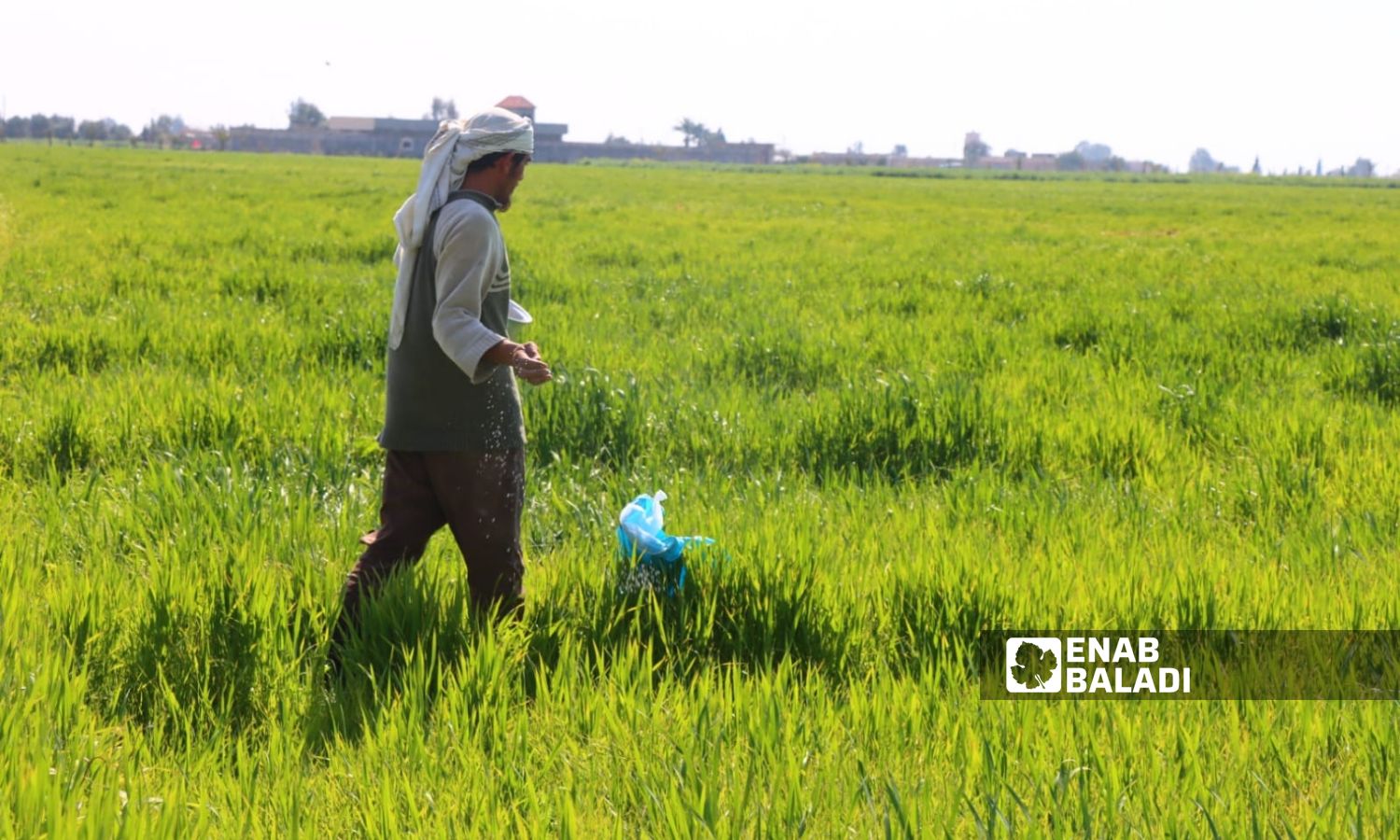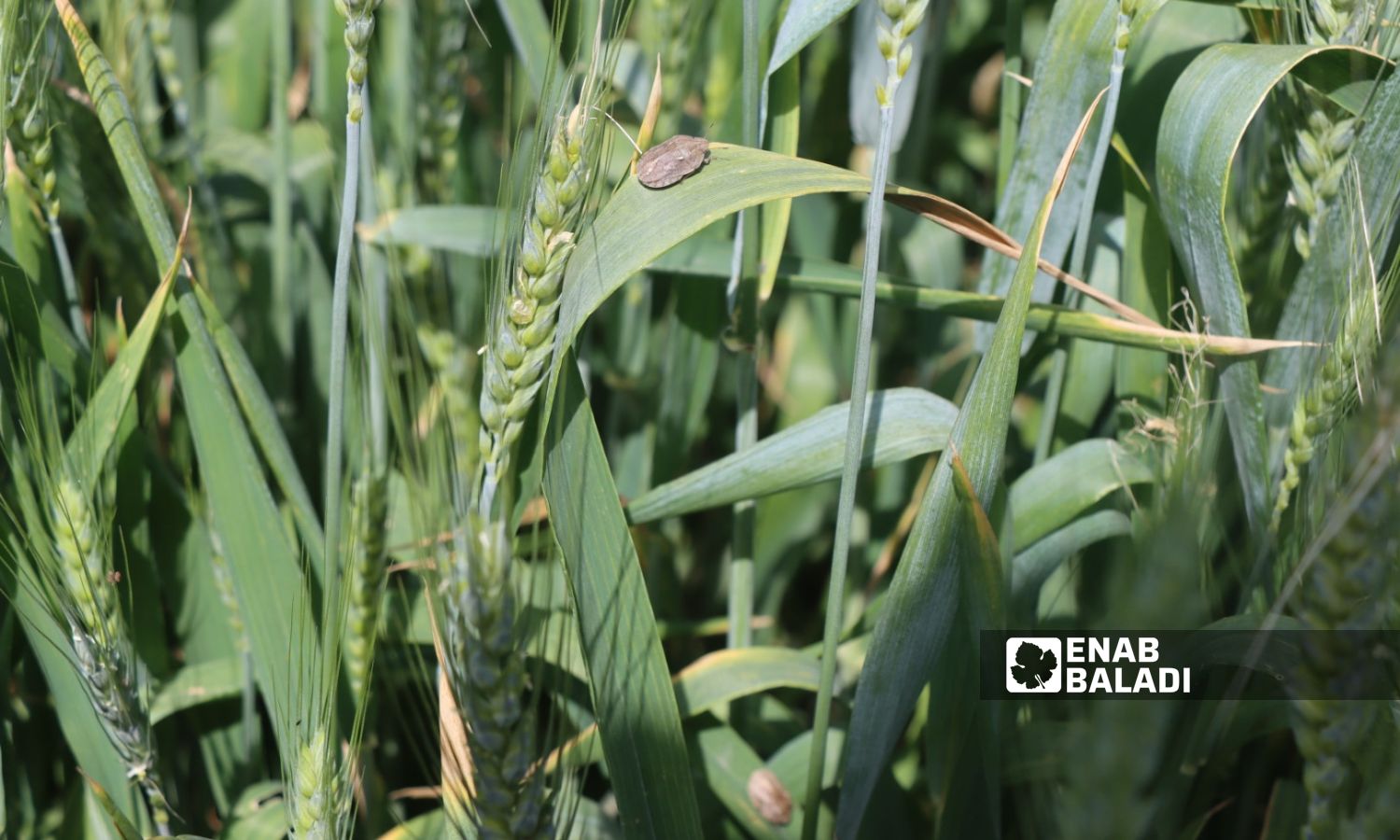



Deir Ezzor – Obadah al-Sheikh
The sunn pest, also known as the “corn bug”, has swept through wheat and barley fields in the northern and eastern countryside of Deir Ezzor, and it is considered one of the most dangerous pests that afflict these crops, causing significant damage.
According to farmers, these pests have proliferated after the climate change that aided in their rapid and notable reproduction, due to the frost waves that struck the region.
Khlaif al-Abdullah, a farmer from the town of al-Shaheel in the eastern countryside of Deir Ezzor, told Enab Baladi that more than two-thirds of his land area, which spans 150 dunams divided between the area of al-Shaheel in the east of Deir Ezzor and Ruwaished to the north, was damaged due to the sunn pest.
He pointed out that the agricultural pesticides he sprayed on his crop did not kill the insects, although he repeated the spraying more than once over a short period.
He added that when he consulted the agricultural engineer in his area, it became clear that the pesticides were lightly concentrated, locally manufactured poorly, and would not yield any effective result no matter how often the spraying was repeated.
He mentioned that the agricultural pharmacies in the area did not diagnose the pest properly or recommend and provide special pesticides, noting that the majority of the agricultural pharmacists relied on the cotton worm pesticide, but it was of no use.
Anwar al-Khlaif, a farmer from the town of al-Shaheel in the eastern Deir Ezzor, had over 40 dunams out of his total land area of approximately 135 dunams damaged by the pest.
According to the farmer, most of the land that was affected is planted with hard German Progen seeds, pointing out that the pest infestation had previously spread to the lands of the city of Qamishli in 2010, causing severe losses to the farmers.
On the other hand, Aber al-Awad, a farmer who invested land with an area of 100 dunams to cultivate wheat in the Badiyat Abu Khashab in the north of Deir Ezzor, fears financial losses as a result of the spread of the sunn pest on his land.
He told Enab Baladi that more than 70 dunams were damaged because of his delay in inspecting the land, noting that he has thus far paid more than 3,000 US dollars for land rental, wheat seeds, fertilizers, fuel, and labor.

The sunn pest inflicts damage on the wheat crop in Deir Ezzor – March 28, 2024 (Enab Baladi/Obadah al-Sheikh)
The sunn pest is a dangerous insect that threatens wheat and barley, capable of destroying the entire crop if the climate is conducive to its reproduction and the farmers delay in combating it.
The adult insect feeds on the leaves and stalks by sucking its plant sap, as well as the nymphs and resulting adult insects feed on the spikes, absorbing the grain’s milky juice, which results in shriveled grains, and the infestation affects flour specifications and germination rates.
Agricultural engineer Walid Zaaiter told Enab Baladi that the frost wave during the blooming period of the crop is one of the main reasons for the spread of the sunn pest and the damage to the crop this year, in addition to the effect of the wave on the copper deficiency, which caused deformations in the spikes, noting that the currently widespread sunn pest feeds on the milky sap of the grains.
He stated that this year’s crop infestation by the sunn pest is strong, and that the pest spread within a short period, noting that its treatment is carried out with an insecticide specifically designed to combat it, in addition to foliar fertilizers containing various elements.
For his part, Ammar al-Mash’al, an agricultural pharmacist in Deir Ezzor, considered that farmers are ignorant of dealing with such an “epidemic” despite its danger, as they reduce the use of pesticides due to its high cost, noting that the treatment is available, and the matter requires follow-ups and periodic inspection.
He mentioned that the cost of the necessary treatment varies depending on the company and the quality, with the treatment cost for every ten dunams estimated at about 250,000 Syrian pounds (1 dollar equals 14,000 Syrian pounds).
Al-Mash’al told Enab Baladi that the frost this season hit most projects, especially in the al-Bakouria region, and clarified that the spread of pests is seasonal, but it was significant this year, causing an “infestation” that caused severe losses to farmers, despite attempts at treatment.
The Agriculture and Irrigation Committee of the Autonomous Administration of North and East Syria (AANES) did not announce any statistics on the area of agricultural land affected by the sunn pest.
A member of the Agriculture and Irrigation Committee (who preferred not to be named since he is not authorized to speak to the media) told Enab Baladi that the farmers themselves did not comply with warnings the committee issued more than a month ago.
He added that the committee has been sending specialized teams since the beginning of March to monitor the agricultural crops, but has not provided any support or pesticides to combat the pests that have spread and affected extensive agricultural areas.
Wheat constitutes one of the main food resources for Syrians, as it is linked to dietary habits based on high consumption of its derivatives.
if you think the article contain wrong information or you have additional details Send Correction